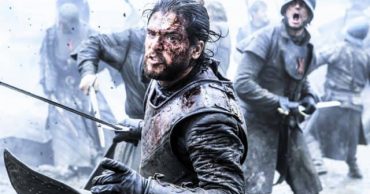
Opening with Yara’s attempts to save her brother and closing with Tyrion’s attempts to save his own life, “The Laws of Gods and Men” is a Game of Thrones episode bookended by two characters seeking justice, a malleable concept in a world where no less than four people laying claim to the Iron Throne. But stuck in the middle of Tyrion’s trial, Dany’s struggles at Mereen, and Yara’s quest to save what’s left of Theon (excuse me; “Reeeeeek“) is arguably the most fascinating scene of the season, in which a prince and a lord (who isn’t really a lord at all) share a bit of conversation.
That’s not to discount Tyrion’s trial: the slow burn of testimony that consumes the second half gives ample (and much-needed) screen time to Peter Dinklage, beautifully portraying a man tired of protecting a family and realm that doesn’t appreciate it. As the climatic moment of the episode (literally closing as the tension reaches its fever peak, with Tyrion demanding a trial by combat once again), most will remember Tyrion’s devastating, brutal dialogue as the episode’s most integral – which it might be, moving a plot line out of a holding patter and pushing the Lannister family to the brink of collapse. And they should; there hasn’t been enough Dinklage all season, and the Tywin-judged trial sequence briefly transforms Game of Thrones into a medieval courtroom drama (a mash-up genre I really hope NBC doesn’t renew a one-hour series for during upfronts), and a meticulously slow-paced one, at that, something that pays off as Shae’s testimony slowly tears apart Tyrion’s heart on the defendant’s stand.
It’s a powerful scene, and one that is representative of “The Laws of Gods and Men” as a whole: everyone at Tyrion’s trial (and in the scenes preceding it) seeks justice of some sort, depending on who they are and where their allegiances lie. Some of these stories are more affecting than others, of course – Yara’s journey felt like an empty one before she left, the ‘birth’ of Reek negating her need to travel all the way north – but ideologically, they are one and the same, a connecting thread that writer Bryan Cogman masterfully weaves through both halves of the episode, pausing for but a moment on two of the show’s most enigmatic characters: Varys and Oberyn.
Putting aside what a great nod it was to previous Varys/Littlefinger scenes in the throne room, the pairing of Oberyn and Varys puts two very compelling personalities in direct comparison with each other. Where Varys is a man who doesn’t seek justice or feel desire for anything, Oberyn is a man driven by both, two sides of an intellectual coin, one disinterested in the workings of power (Oberyn doesn’t even know what he is Master of on the small council) and one consumed by it. Two men, existing on different ends of most psychological and physical spectrums, playing a game of verbal chess: like the scenes in previous seasons, the meta surrounding the conversation is almost more fascinating than the dialogue itself, driven by Conleth Hill’s consistently creepy performance as the ambitious, castrated man from Essos.
Like the concept of power, ‘justice’ is a very subjective thing, something that must be sought (never possessed, as Khaleesi is quickly learning), and always driven by a desire for something – vengeance (Shea), favor with those in power (Mace Tyrell), or simply, a way to repair something in us that is broken (like Loreq, whose father was nailed to one the many signs to Mereen). And seeking justice is often something that exposes our weaknesses: Dany’s victories haven’t prepared her to lead, just as Tywin’s hatred for his son has clouded his judgment as an independent arbitrator in Tyrion’s case. Cersei fits right in here, too: her desire to seek vengeance on whoever killed her son sees her blind to reason, ready to destroy her own family in the name of “justice”.
In the end, it’s the quest for some kind of justice that drives every character in Game of Thrones – but it’s the fallout from those decisions that define Westeros, where desire and determination can be one’s biggest friend, or biggest enemy (Ned, anybody?). Anchored by Tyrion’s performance (which gives an otherwise scattered episode purpose), “The Laws of Gods and Men” explores this concept, pointing out just how many shadows lie across the beacon of righteousness most work under when they’re attempting to get revenge. Justice is an attempt to balance the scales of right and wrong: but driven by personal desires and beliefs, the characters of Game of Thrones are learning that the sword is much mightier than the pen, a world driven by secret jealousies and the knowledge that the scales of justice are never balanced – as we remember, the stories are written by the victors, whose desires and quests for personal redemption always cloud the truth of world events.
Other thoughts/observations:
– another sign that those without loyalties or regrets have the most power: Stannis and Davos visit the Iron Bank, who could care less about family lineages or who “should” be in power at King’s Landing.
– Arya’s quest to save her brother doesn’t go as planned: Reek rejects her attempts to save him, and most of her men are killed before she escapes. Speaking of that scene, I really hope Ramsay isn’t bloodied because he just killed the woman he was having sex with.
– Don’t look now Dany, but your dragons are beginning to terrorize the landscape.
– Tywin offers 100 silver whatevers for a commoner to hunt down the Hound, a plan I think may not work as well as advertised (even he admits nobody can take him out, save for his brother).
– now Reek is going to pretend to be Theon (for an unknown reason), which all but ensures Theon’s character will remain in a holding pattern for the rest of the season. Unless we get lucky and someone puts him out of his misery first.
– Peter Dinklage during Shae’s speech was absolute perfection. What a commanding performance in what is essentially a scene with no dialogue (except “Please don’t”). Of the many heartbreaking scenes in GoT history, this one ranks near the top (although it does so by sacrificing Shae as an intelligent character, forcing her into filling the role of spiteful lover, and catalyzing a handful of “nothing worse than a woman scorned” cliches on Twitter last night).
[Photo via HBO]
 Follow Us
Follow Us





